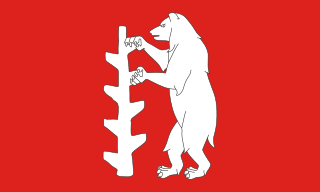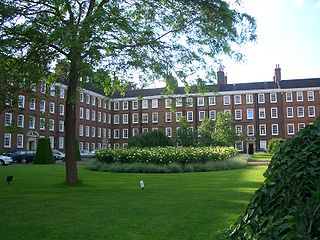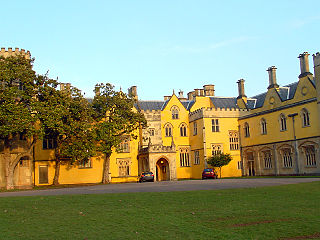Sir Ralph Bovey, 1st Baronet (died 11 October 1679), of Hillfields, Warwickshire, England was High Sheriff of Warwickshire and, later, Bedfordshire.

Warwickshire is a landlocked county in the West Midlands region of England. The county town is Warwick, although the largest town is Nuneaton. The county is famous for being the birthplace of William Shakespeare.
In 1633 he was admitted to Gray's Inn. He was an attorney of the Court of Common Pleas. He held the office of Sheriff of Warwickshire for 1652 and lived in Solihull, Warwickshire. He was High Sheriff of Bedfordshire in November 1668 and from 1669 to 1670 and lived in Long Stow, Cambridgeshire.

The Honourable Society of Gray's Inn, commonly known as Gray's Inn, is one of the four Inns of Court in London. To be called to the bar and practise as a barrister in England and Wales, a person must belong to one of these Inns. Located at the intersection of High Holborn and Gray's Inn Road in Central London, the Inn is both a professional body and a provider of office accommodation (chambers) for many barristers. It is ruled by a governing council called "Pension", made up of the Masters of the Bench, and led by the Treasurer, who is elected to serve a one-year term. The Inn is known for its gardens, or Walks, which have existed since at least 1597.

The Court of Common Pleas, or Common Bench, was a common law court in the English legal system that covered "common pleas"; actions between subject and subject, which did not concern the king. Created in the late 12th to early 13th century after splitting from the Exchequer of Pleas, the Common Pleas served as one of the central English courts for around 600 years. Authorised by Magna Carta to sit in a fixed location, the Common Pleas sat in Westminster Hall for its entire existence, joined by the Exchequer of Pleas and Court of King's Bench.
The Sheriff is the oldest secular office under the Crown. Formerly the High Sheriff was the principal law enforcement officer in the county but over the centuries most of the responsibilities associated with the post have been transferred elsewhere or are now defunct, so that its functions are now largely ceremonial. The High Sheriff changes every March. Under the provisions of the Local Government Act 1972, on 1 April 1974 the office previously known as Sheriff was retitled High Sheriff.
He was created a baronet, of Hillfields in the County of Warwick, on 30 August 1660. He died in 1679 without issue and was buried in linen at Long Stow. The title died with him. He had married the daughter of 1st Baron Maynard.

A baronet or the rare female equivalent, a baronetess, is the holder of a baronetcy, a hereditary title awarded by the British Crown. The practice of awarding baronetcies was originally introduced in England in the 14th century and was used by James I of England in 1611 as a means of raising funds.

Viscount Maynard, of Easton Lodge in the County of Essex, was a title in the Peerage of Great Britain. It was created in 1766 for Charles Maynard, 6th Baron Maynard, Lord-Lieutenant of Suffolk. He was made Baron Maynard, of Much Easton in the County of Essex, at the same time, also in the Peerage of Great Britain. Both titles were created with special remainder, failing male issue of his own, to his kinsman Sir William Maynard, 4th Baronet. The 1st Viscount was unmarried and on his death in 1775 the baronetcy of Easton Parva, the Irish barony of Maynard created in 1620 and the English barony of Maynard created in 1628 became extinct. He was succeeded in the barony of 1766 and the viscountcy according to the special remainder by his kinsman Sir Charles Maynard, 5th Baronet, who became the 2nd Viscount. The latter was succeeded by his nephew, the 3rd Viscount, who served as Lord-Lieutenant of Essex. He had no surviving male issue and on his death in 1865 the baronetcy, barony and viscountcy became extinct. His granddaughter, Daisy Maynard, daughter of Colonel the Honourable Charles Henry Maynard and future wife of Francis Greville, 5th Earl of Warwick, succeeded to most of the Maynard estates.







